Aging in place with ADRD
Aging in place with ADRD
Overview
The project aims to support aging in place for individuals living with early-stage Alzheimer’s disease or related dementias (ADRD) and their care partners. The goal is to aid the care partner's supporting individuals with ADRD remotely using off-the-shelf smart technologies.
Care Recipient (CR) - Individuals with ADRD
Care Partner (CP) - Individuals who support people with ADRD
Overview
The project aims to support aging in place for individuals living with early-stage Alzheimer’s disease or related dementias (ADRD) and their caregivers. The goal is to aid independent living for these individuals for as long as possible. It also seeks to allow remote caregivers to quickly check in and monitor with minimal to no invasion of privacy of the people.
Client: IQ Solutions
Role: Lead Designer
Time: 8 months
Tools: Sketch, InVision, Figma
Team: Dawson Hoppes, Dhruvi Patel, Mishi Soni, Naishi Jain, Sravya Amancherla, Zora Moore
Client: IQ Solutions
Role: Lead Designer
Time: 8 months
Tools: Sketch, InVision, Figma
Team: Sravya Amancherla, Dawson Hoppes, Naishi Jain, Zora Moore, Dhruvi Patel, Mishi Soni
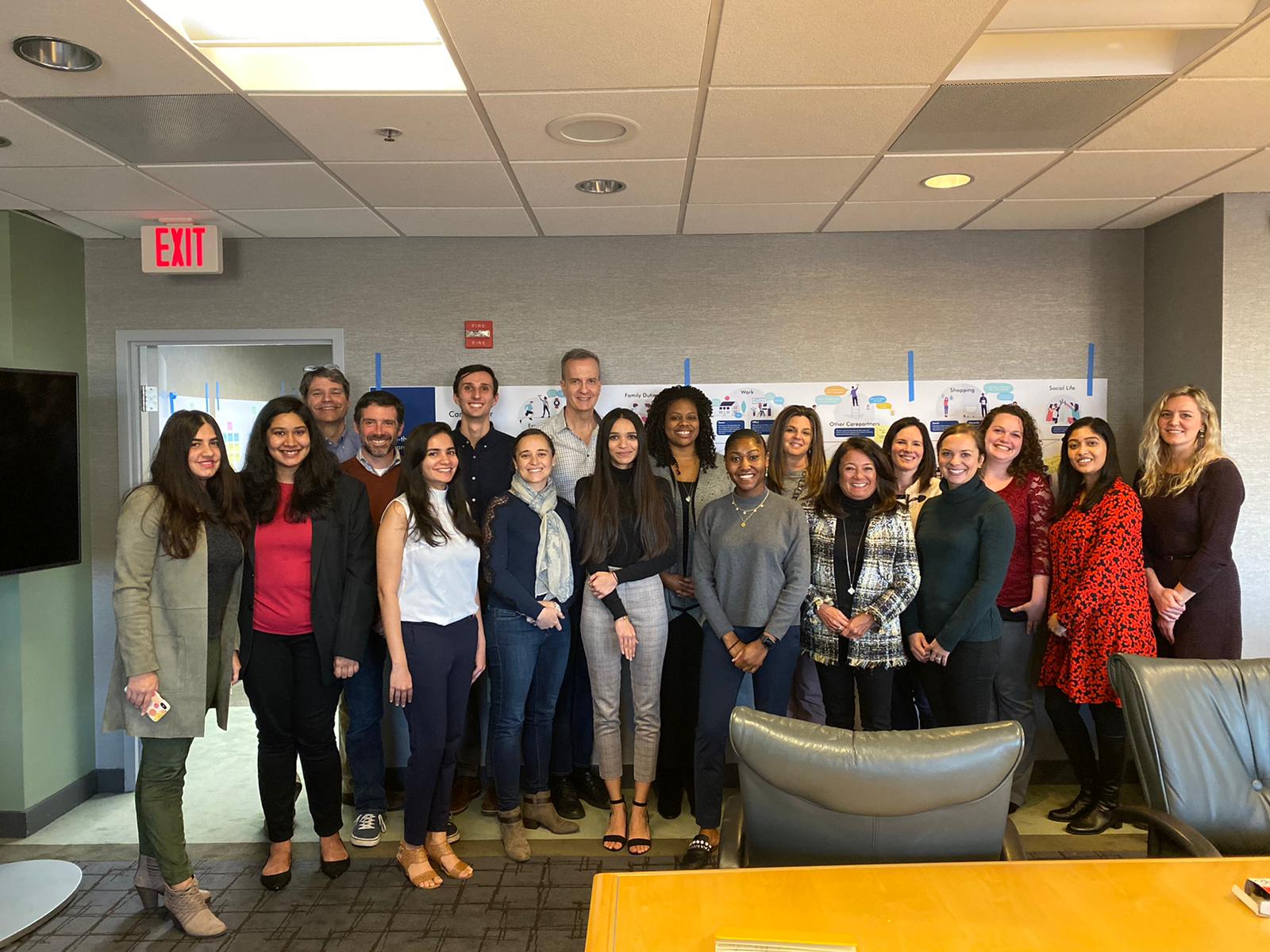
Project Goal
Support aging in place for individuals having early-stage ADRD and their care partners
- Understand the needs, challenges, and expectations of individuals with ADRD for in-home support and remote monitoring for their care partners.
- Design solutions using off-the-shelf smart technologies to support both populations
Project Goal
Support aging in place for individuals having early-stage ADRD and their care partners
- Understand the needs, challenges, and expectations of individuals with ADRD for in-home support and remote monitoring for their care partners.
- Design solutions using off-the-shelf smart technologies to support both populations
Process
Process
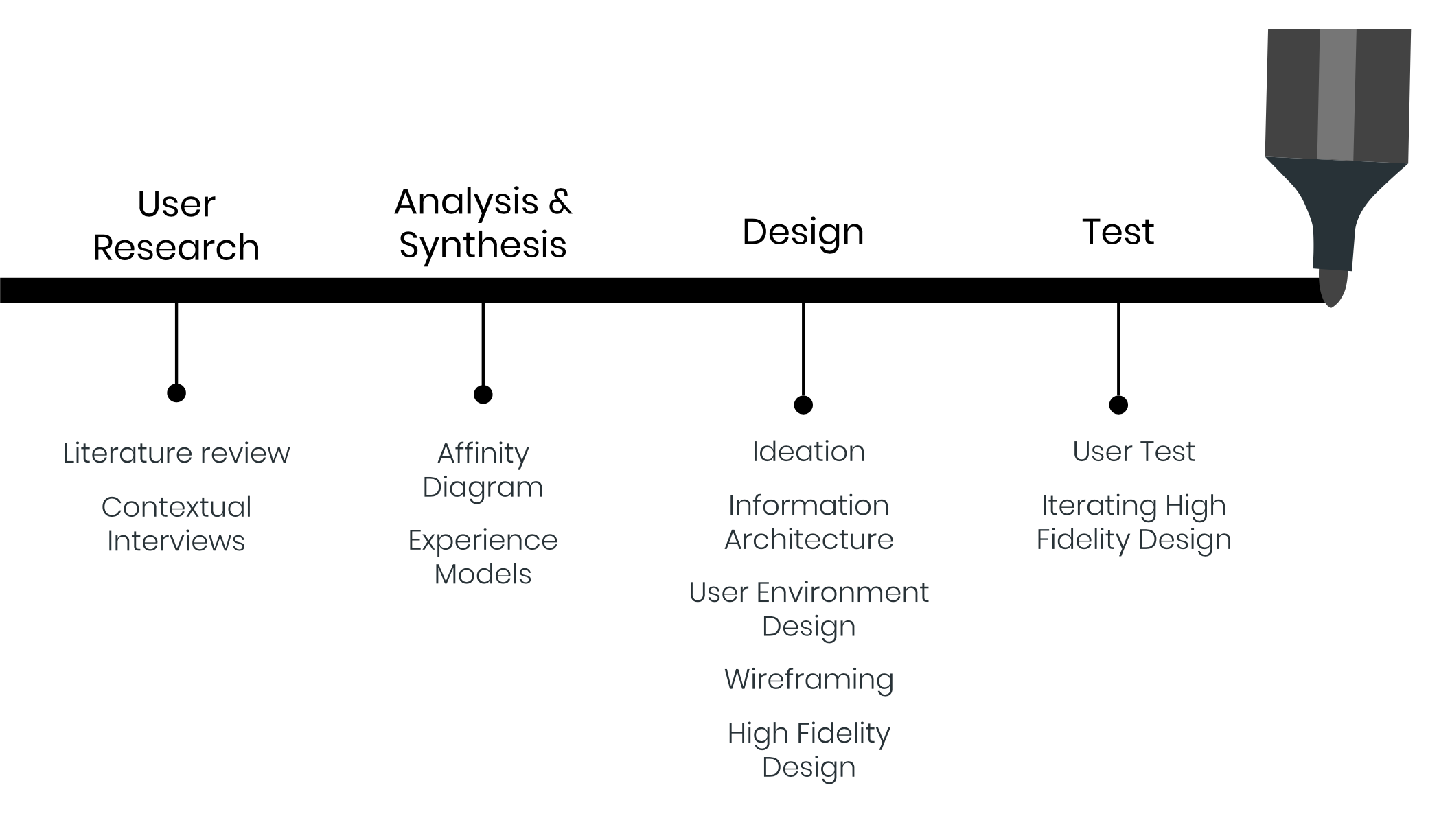
User Research
As a part of the user research, we conducted an extensive literature review and conducted contextual interviews with care partners. We surveyed 71 research papers and articles and conducted interviews with 6 care partners. The following are the demographics of our participants -
User Research
As a part of the user research, we conducted an extensive literature review and conducted contextual interviews with care partners. We surveyed 71 research papers and articles and conducted interviews with 6 care partners. The following are the demographics of our participants -

Analysis and Synthesis
Analysis and Synthesis

The data we collected from the contextual interviews were mapped into an Affinity Diagram. The analysis of our data validated our findings from the background research. The major themes that emerged from our research were -
The data we collected from the contextual interviews was mapped into an Affinity Diagram. The analysis of our data validated our findings from the background research. The major themes that emerged from our research were -
Safety v/s Autonomy
Care partners need to find the right balance between keeping the person they support safe while preserving their independence.
Safety v/s Autonomy
Care partners need to find the right balance between keeping the person they support safe while preserving their independence.
Holistic Care
The best systems are ones that do not focus solely on presenting medical information but try to support the individual and care partners' overall well-being.
Holistic Care
The best systems are ones that do not focus solely on presenting medical information but try to support the individual and care partner's overall well-being.
Personalization
No two people with ADRD are alike. The best way to handle this is to make flexible products that have the ability to be personalized, changed, and adapted over time as the condition grows.
Personalization
No two people with ADRD are alike. The best way to handle this is to make flexible products that have the ability to be personalized, changed, and adapted over time as the condition grows.
Carepartner Burden
Personalization adds another responsibility to the care partner. The future system should support ease of use.
Care partner Burden
Personalization adds another responsibility to the care partner. The future system should support ease of use.
Integrated Care
Future solutions should be well integrated into the individual’s environment instead of being in focus.
Integrated Care
Future solutions should be well integrated into the individual’s environment instead of being in focus.
Elements of identity are sources of pride, self-expression, and core values. We build an identity model using our data to understand our user's values and needs. Using our research insights we were able to build a model that shows the day in the life of a care partner.
Elements of identity are sources of pride, self-expression, and core values. We build an identity model using our data to understand our user's values and needs. Using our research insights we were able to build a model that shows the day in the life of a care partner.

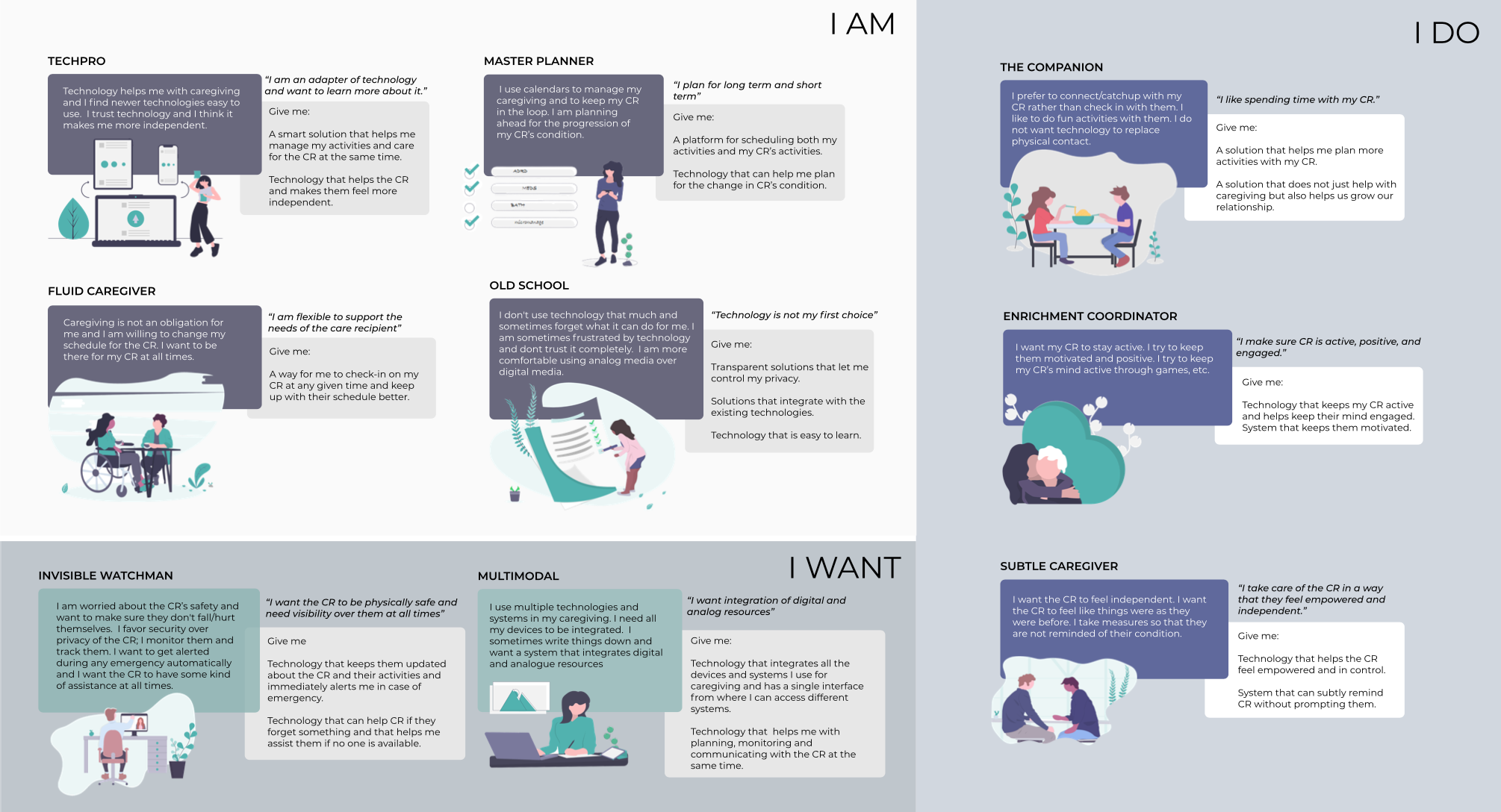
Design
Design
After we completed our affinity diagrams and experience models, we did a wall walk to absorb all the data. Based on our learnings from the wall walk, we came up with different design ideas.
After we completed our affinity diagrams and experience models, we did a wall walk to absorb all the data. Based on our learnings from the wall walk, we came up with different design ideas.
Ideation - Visions & Storyboards
We started our design process by creating some visions which were grounded in our data. We evaluated each vision by focusing on pluses (+), minuses (-), and Design Ideas (DI's). We analyzed each vision and finalized the product concept based on the project focus. We decided to design a mobile application that leverages smart devices to provide assistance with various caregiving activities and regular subtle check-ins.
We brainstormed key user needs and used a scenario-based approach to identify how our product would fit into the day in the life of our users. We created several storyboards and reviewed them as a team to identify any loopholes.
Ideation - Visions & Storyboards
We started our design process by creating some visions which were grounded in our data. We evaluated each vision by focusing on pluses (+), minuses (-), and Design Ideas (DI's). We analyzed each vision and finalized the product concept based on the project focus. We decided to design a mobile application that leverages smart devices to provide assistance with various caregiving activities and regular subtle check-ins.
We brainstormed key user needs and used a scenario-based approach to identify how our product would fit into the day in the life of our users. We created several storyboards and reviewed them as a team to identify any loopholes.
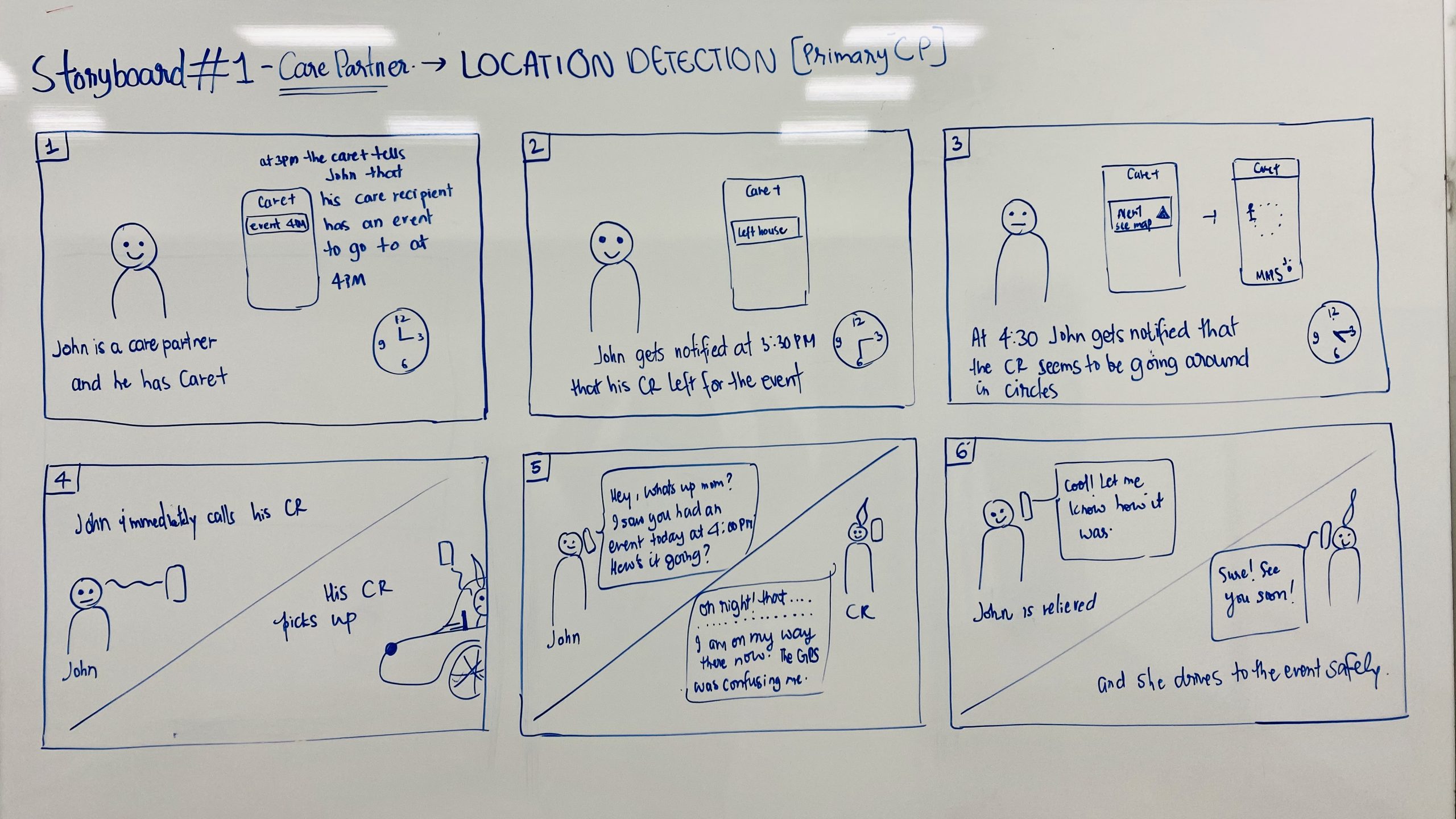


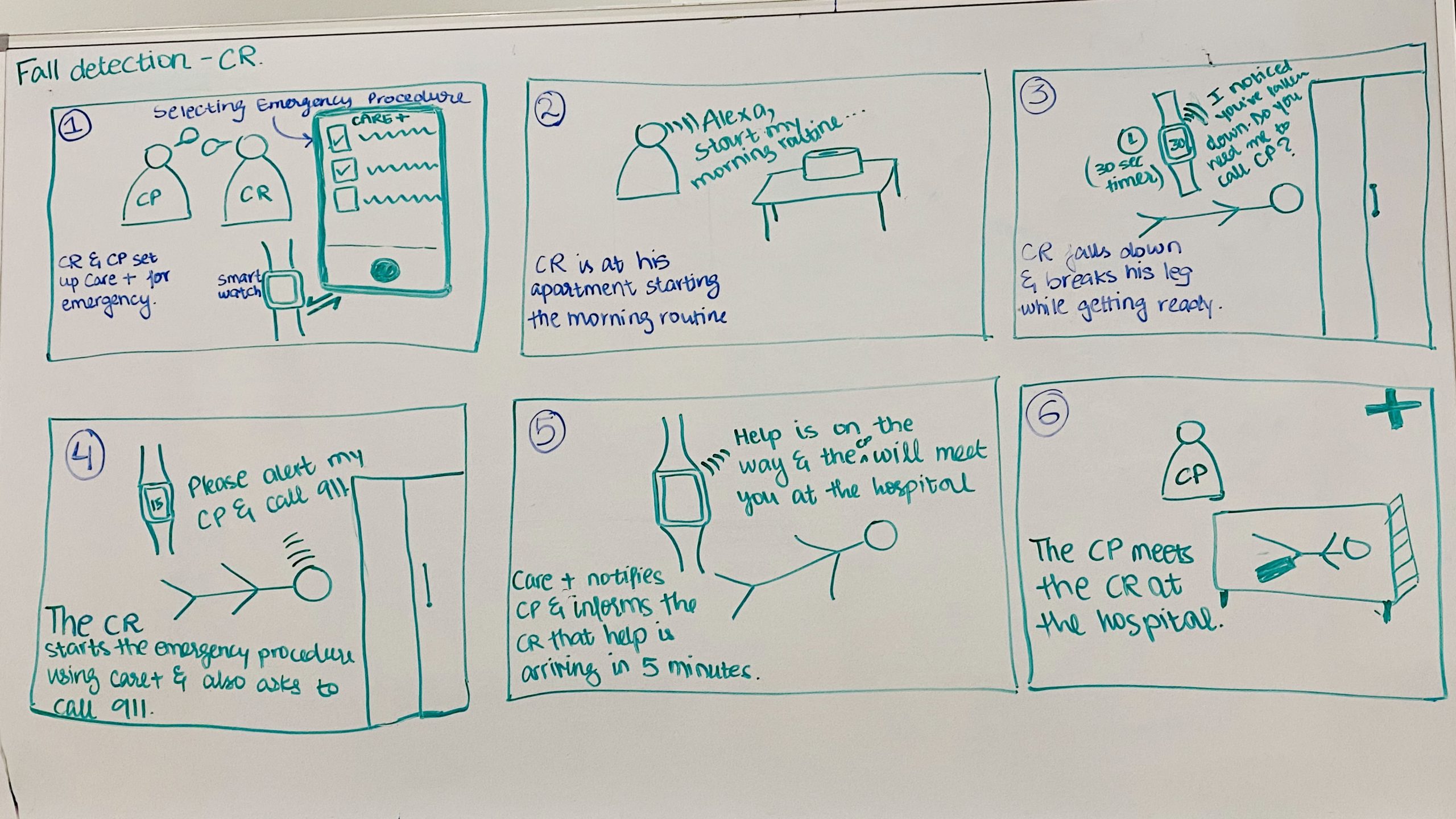
Product Structure
We started organizing and structuring our product concept in a logical way. We designed the information architecture of our mobile application and also created a user environment design (UED) to pin down the major focus areas of our application. We established the basic structure of our application by creating wireframes. We started wireframing our mobile application to layout the content and functionalities on a page that takes into account user needs and user journeys.
Product Structure
We started organizing and structuring our product concept in a logical way. We designed the information architecture of our mobile application and also created a user environment design (UED) to pin down the major focus areas of our application. We established the basic structure of our application by creating wireframes. We started wireframing our mobile application to layout the content and functionalities on a page that takes into account user needs and user journeys.
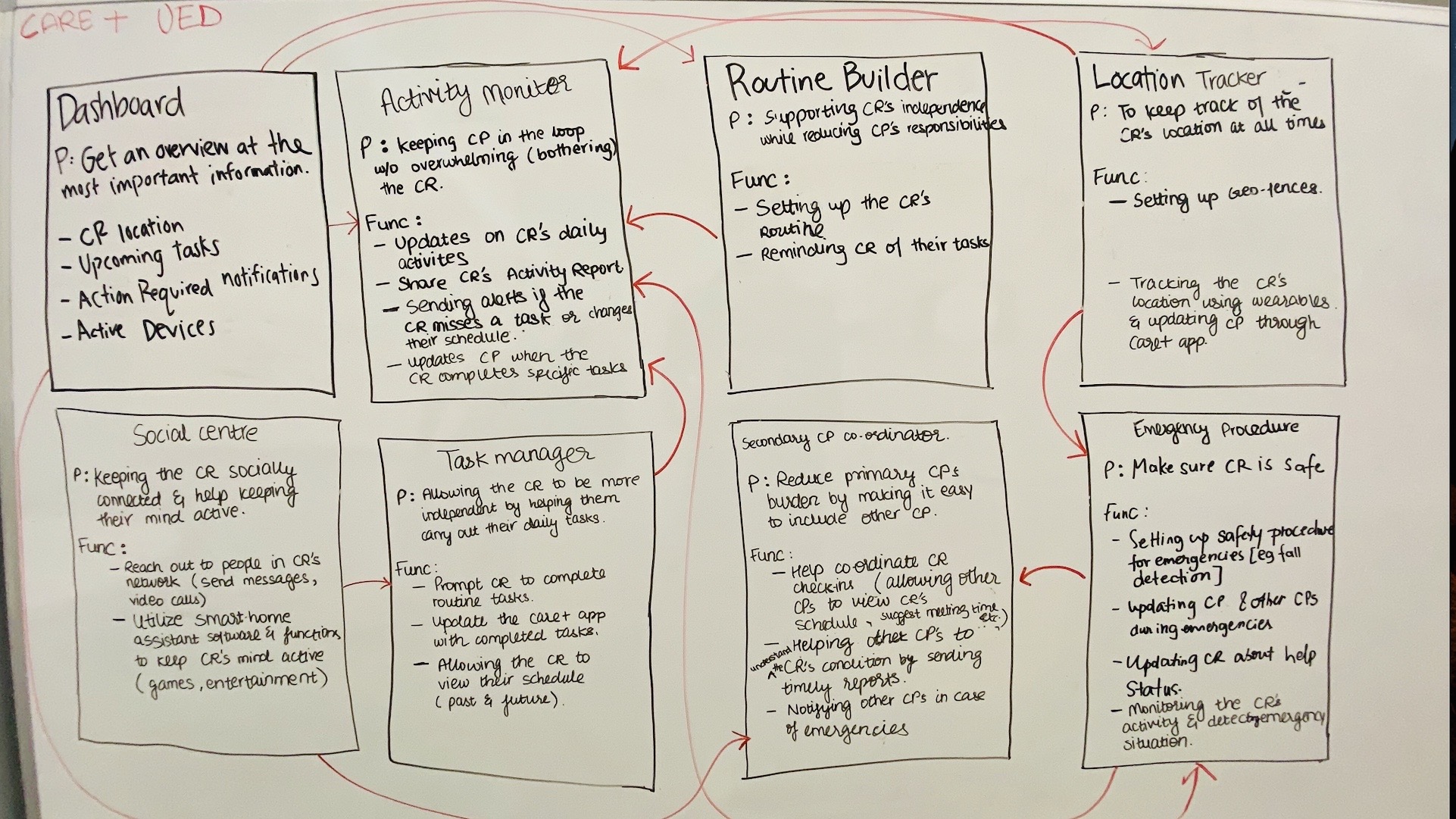

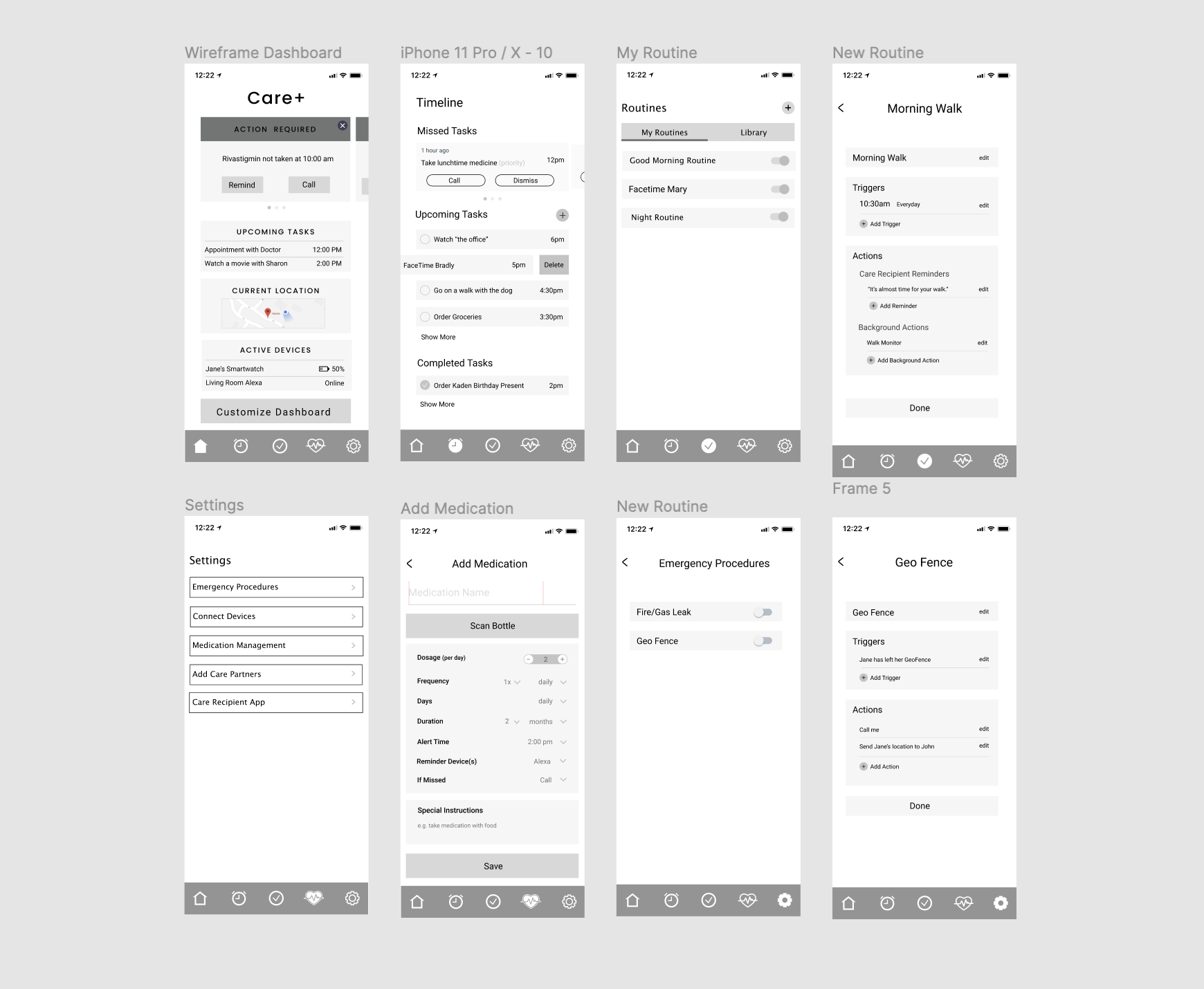
Testing
We conducted moderated user tests with care partners. Each test had one moderator and one note-taker. These are the major insights we got from our user tests -
- The users were confused with some icons on the main navigation. We needed more intuitive visual language.
- The users were confused about the content of the app. We needed to make it more clear and easy to understand.
- The application lacked human touch.
- There were some design consistency issues across features performing similar actions.
- Care partners suggested adding a feature that provides details about CR’s medication and other health metrics.
Testing
We conducted moderated user tests with care partners. Each test had one moderator and one note-taker. These are the major insights we got from our user tests -
- The users were confused with some icons on the main navigation. We needed more intuitive visual language.
- The users were confused about the content of the app. We needed to make it more clear and easy to understand.
- The application lacked a human touch.
- There were some design consistency issues across features performing similar actions.
- Care partners suggested adding a feature that provides details about CR’s medication and other health metrics.
Final Design
We iterated our designs based on the feedback we received from the user testing. We created a style guide for our mobile application and started designing the high-fidelity screens.
Final Design
We iterated our designs based on the feedback we received from the user testing. We created a style guide for our mobile application and started designing high-fidelity screens.
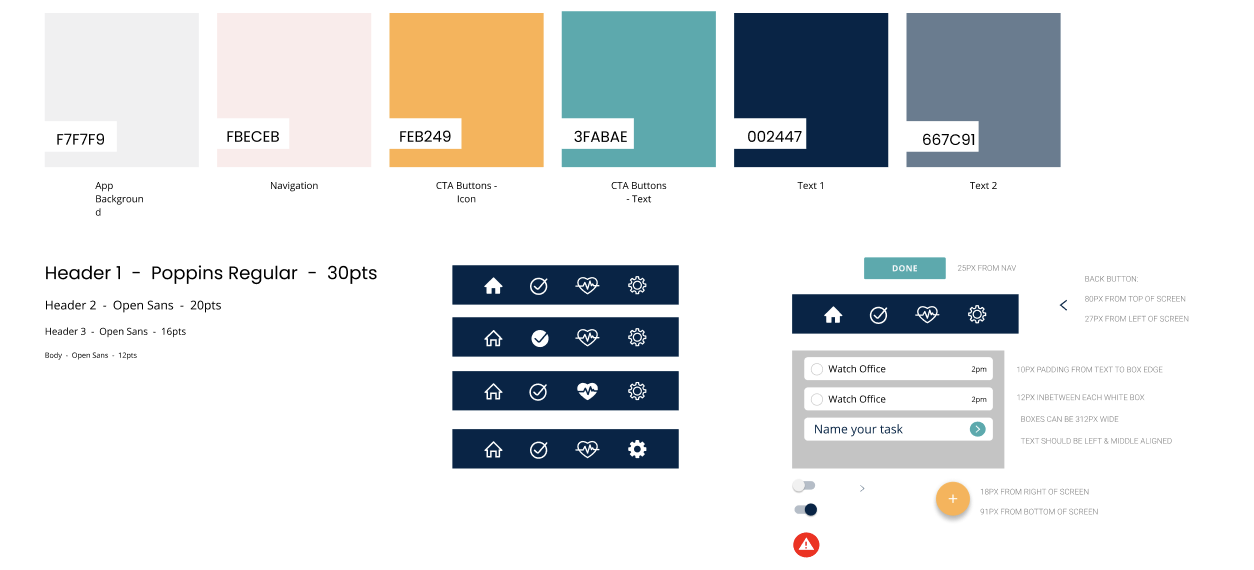
Care +
Care + is a mobile application that leverages smart speakers to provide assistance with various caregiving activities and regular subtle check-ins. It can be integrated with any smart device such as Amazon Echo, Apple Watch, Google Home, etc.
The application has been designed only for the care partners. Future work would account for the care recipient's side of the app.
Care +
Care + is a mobile application that leverages smart speakers to provide assistance with various caregiving activities and regular subtle check-ins. It can be integrated with any smart device such as Amazon Echo, Apple Watch, Google Home, etc.
The application has been designed only for the care partners. Future work would account for the care recipient's side of the app.

The main dashboard of the application shows all the information a care partner needs at a glance. It has customizable widgets to choose from to add to the dashboard. The app also allows care partners to add emergency procedures that get triggered in specific emergency situations.
The main dashboard of the application shows all the information a care partner needs at a glance. It has customizable widgets to choose from to add to the dashboard. The app also allows care partners to add emergency procedures that get triggered in specific emergency situations.
The timeline feature of the Care+ app allows care partners to view the care recipient's daily activities. It allows them to view and get alerts if the CR has missed any tasks. The CP can also add new tasks and set up routines for the CR.
The timeline feature of the Care+ app allows care partners to view the care recipient's daily activities. It allows them to view and get alerts if the CR has missed any tasks. The CP can also add new tasks and set up routines for the CR.

The application also has a health and medication management section. It allows the CP to view all the health-related metrics of the CR. The app allows the CP to add medications that the CR has to take and sends alerts and notifications to the CP in case the CR misses taking any medication.
The application also has a health and medication management section. It allows the CP to view all the health-related metrics of the CR. The app allows the CP to add medications that the CR has to take and sends alerts and notifications to the CP in case the CR misses taking any medication.
Limitations
- We could not interview individuals with ADRD.
- The application is designed only from the care partners' perspective for the scope of this project.
Limitations
- We could not interview individuals with ADRD.
- The application is designed only from the care partners' perspective for the scope of this project.
Contact:
LinkedIn: linkedin.com/in/dhruvipatel2496/
Email: dhruvipatel2496@gmail.com
Resume: Download now